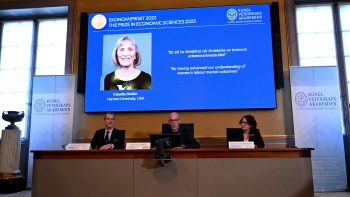TEXT OF STORY
Kai Ryssdal: Can the financial system be redesigned to better serve more people? That’s the focus of our Marketplace series, Economy 4.0. Instead of just following the money, perhaps we should take better account of our happiness and well-being. Influential financial leaders talked about that, at the Davos conference that just wrapped in Switzerland. But researchers have yet to resolve a key question: To what extent do happiness and money go hand in hand?
Our special correspondent David Brancaccio traveled to, of all places, Bulgaria to find out.
Sound of church bells
David Brancaccio: Sunlight peeks into a winter’s day in Sofia, the capital of Bulgaria. A mom sits on a concrete bench, her little boy quietly playing with a friend. Happy? Eh.
Woman speaking Bulgarian
“I think it’s getting worse and worse,” she says. She reads water meters for the city utility and sees a lot of apartments.
Woman speaking
“I know how people live,” she says, “most barely make ends meet.”
Surveys confirm that Bulgarians are relatively miserable. Which is a little weird, given how well the Bulgarian economy has been growing. Georgi Angelov is a senior economist with the Open Society Institute in Sofia.
Georgi Angelov: We had about 13 years of increasing economic growth, which is maybe unprecedented in our history.
The other good news is that export growth is the highest in the European Union.
Justin Wolfers: Bulgaria’s a reasonably developed country, so you would expect it to be very happy, but Bulgaria is sad relative to its income.
Justin Wolfers and a colleague at the Wharton business school discovered that while richer individuals are not necessarily happier, the richer the country as a whole, the happier the country as a whole. Except Bulgaria, a somber example of why happiness is complex.
Wolfers: The gap between what we might expect and where they are is quite large, but they’ve certainly seen a lot in their lives.
They have, including a period of turbulence once communism collapsed after 1989. It shook people up, the birth rate declined and many left.
Ivo and Nadin Domozetov are a young couple who stuck it out. They own a small, nicely-furnished apartment in Sofia. Ivo designs jewelry and watches Alexander, their two-year-old LEGO expert. Nadin has a good job with a multinational that tests new medicines. She says her salary’s fine, but her finances are often stretched by family obligations.
Nadin Domozetov: For example, my mother, my sister. I need to help them.
Brancaccio: You have to share some of your income with your mother. She doesn’t work or does she work?
Nadin: She works, but she receive less than 300 levas.
Three hundred lev a month. We do the math on the back of a napkin. Nadin’s mother works as a librarian at the Sofia Library for about $2,400 a year. Not a month — per year. Nadin’s husband confirms.
Ivo Domozetov: Yeah it’s cheaper here than in most of Europe, but this money is totally not enough and she isn’t the exception. That’s the middle class.
And that middle class is shrinking, according to Andrei Raichev, who co-founded the Gallup International research company here. He draws a graph of Bulgaria under communism: Tiny elite, lots in the middle, small percentage of poor. Now, there’s a much bigger elite but also a lot of people with lower incomes. In other words, increased inequality.
Andrei Raichev: This have to be a source of very serious source of pessimism, of dark, or black picture of the world.
Another source of dissatisfaction may be the human tendency to keep up with the neighbors, such as those in richer parts of the European Union. Economist Georgi Ganev illustrates this by pointing out that under communism, many Bulgarians were comparing their vehicles to the old eastern-bloc Lada.
Georgi Ganev: Guess what, almost any car looks very nice, even though it was complete crap. Now we compare with the latest Mercedes and Beemers and you cannot be very happy.
Ganev, who works at the Centre for Liberal Strategies in Sofia, says this also applies to standards of living.
Ganev: Everybody in Bulgaria, when they quote why they’re dissatisfied, would basically mention how things are done in Germany and Switzerland and never mention how things are done in Bosnia or Russia.
But Justin Wolfers at Wharton isn’t buying that hypothesis.
Wolfers: The view that what matters is keeping up with the Joneses is not a view that’s supported by the data. It’s very intuitively plausible; it’s just wrong.
Perhaps the problem is the data. According to Ganev, people can be wary about sounding too happy when pollsters ask.
Ganev: Public optimism is not a very common tradition in Bulgaria. We don’t want to mess with good luck, so we say things are bad.
It’s a phenomenon governments need to take into account as more countries like Britain and Canada work to measure happiness on a regular, official basis.
In Sofia, Bulgaria, I’m David Brancaccio for Marketplace.
Moon: For another view of happiness in Bulgaria, check out David’s Economy 4.0 blog. To hear more of David’s Economy 4.0 reporting, tune into tomorrow’s Marketplace Morning Report.
There’s a lot happening in the world. Through it all, Marketplace is here for you.
You rely on Marketplace to break down the world’s events and tell you how it affects you in a fact-based, approachable way. We rely on your financial support to keep making that possible.
Your donation today powers the independent journalism that you rely on. For just $5/month, you can help sustain Marketplace so we can keep reporting on the things that matter to you.


















